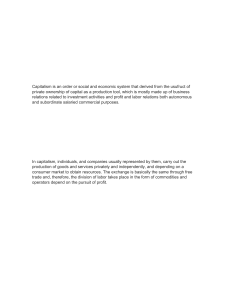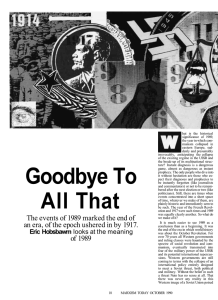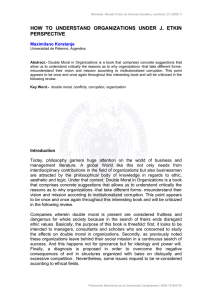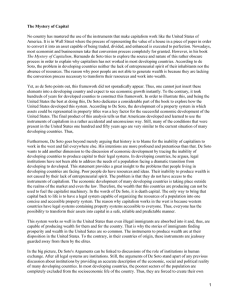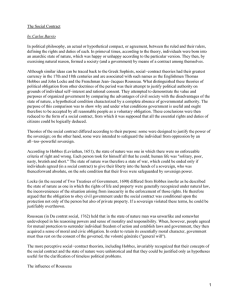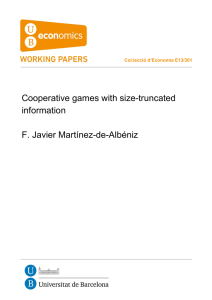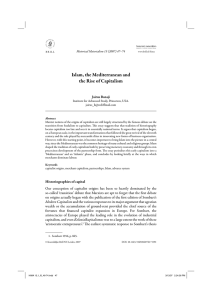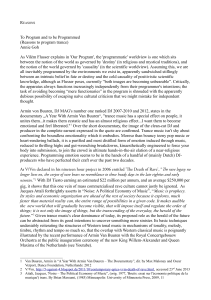INTRODUCTION
Anuncio
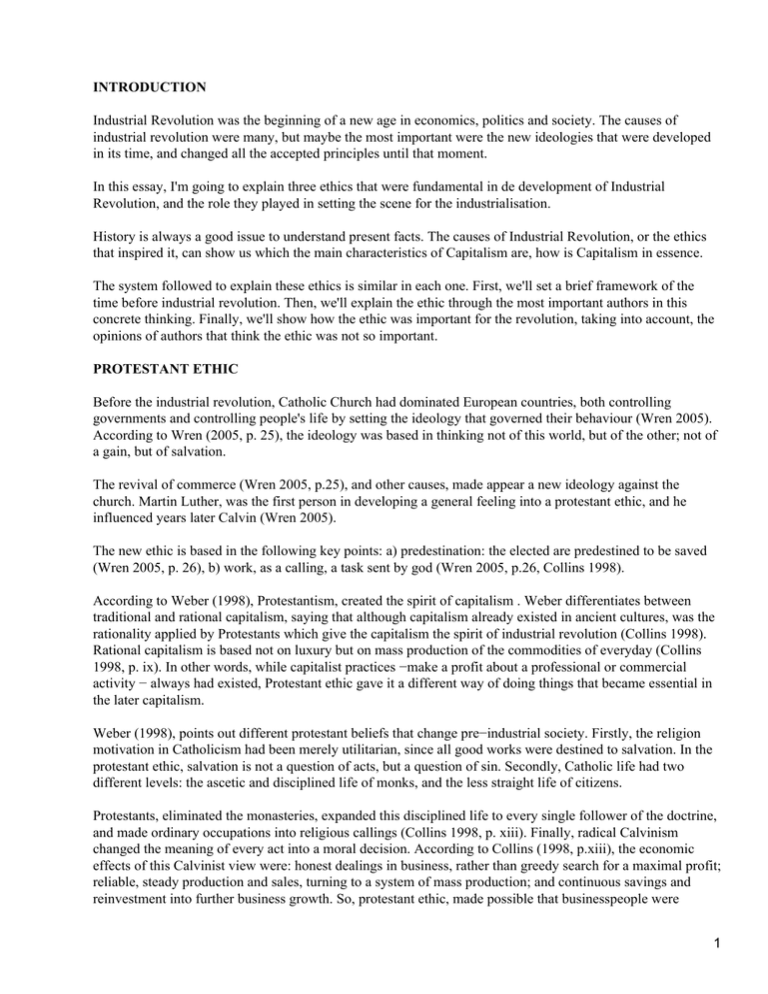
INTRODUCTION Industrial Revolution was the beginning of a new age in economics, politics and society. The causes of industrial revolution were many, but maybe the most important were the new ideologies that were developed in its time, and changed all the accepted principles until that moment. In this essay, I'm going to explain three ethics that were fundamental in de development of Industrial Revolution, and the role they played in setting the scene for the industrialisation. History is always a good issue to understand present facts. The causes of Industrial Revolution, or the ethics that inspired it, can show us which the main characteristics of Capitalism are, how is Capitalism in essence. The system followed to explain these ethics is similar in each one. First, we'll set a brief framework of the time before industrial revolution. Then, we'll explain the ethic through the most important authors in this concrete thinking. Finally, we'll show how the ethic was important for the revolution, taking into account, the opinions of authors that think the ethic was not so important. PROTESTANT ETHIC Before the industrial revolution, Catholic Church had dominated European countries, both controlling governments and controlling people's life by setting the ideology that governed their behaviour (Wren 2005). According to Wren (2005, p. 25), the ideology was based in thinking not of this world, but of the other; not of a gain, but of salvation. The revival of commerce (Wren 2005, p.25), and other causes, made appear a new ideology against the church. Martin Luther, was the first person in developing a general feeling into a protestant ethic, and he influenced years later Calvin (Wren 2005). The new ethic is based in the following key points: a) predestination: the elected are predestined to be saved (Wren 2005, p. 26), b) work, as a calling, a task sent by god (Wren 2005, p.26, Collins 1998). According to Weber (1998), Protestantism, created the spirit of capitalism . Weber differentiates between traditional and rational capitalism, saying that although capitalism already existed in ancient cultures, was the rationality applied by Protestants which give the capitalism the spirit of industrial revolution (Collins 1998). Rational capitalism is based not on luxury but on mass production of the commodities of everyday (Collins 1998, p. ix). In other words, while capitalist practices −make a profit about a professional or commercial activity − always had existed, Protestant ethic gave it a different way of doing things that became essential in the later capitalism. Weber (1998), points out different protestant beliefs that change pre−industrial society. Firstly, the religion motivation in Catholicism had been merely utilitarian, since all good works were destined to salvation. In the protestant ethic, salvation is not a question of acts, but a question of sin. Secondly, Catholic life had two different levels: the ascetic and disciplined life of monks, and the less straight life of citizens. Protestants, eliminated the monasteries, expanded this disciplined life to every single follower of the doctrine, and made ordinary occupations into religious callings (Collins 1998, p. xiii). Finally, radical Calvinism changed the meaning of every act into a moral decision. According to Collins (1998, p.xiii), the economic effects of this Calvinist view were: honest dealings in business, rather than greedy search for a maximal profit; reliable, steady production and sales, turning to a system of mass production; and continuous savings and reinvestment into further business growth. So, protestant ethic, made possible that businesspeople were 1 interested in business growth more than in short term profit, which is necessary preconditions to industrial revolution. Weber gives examples of Puritan −also called like this way by Weber− ideology, collecting sentences of Franklin, in order to demonstrate the relation between Puritanism and Capitalism: Remember that time is money, Remember that credit is money, Remember, that money is of the prolific, generating nature (Franklin cited in Weber 1998, p. 48−49). Although, the influence of Protestant ethic as a precondition to industrial revolution is commonly accepted (Wren 2005, Collins 1998), there are also some critics. Robertson (1953), argues that Weber's thesis is erroneous because its historic mistakes: they (he and his school) not only inaugurated a whole literature, they gave the direction to the whole of modern thought on a fundamental problem of economic history. (Robertson 1973, p. 53). Furthermore, Tawney (1973) explained that Protestantism was an effect of capitalism and not the cause. The author argued that Catholic Church were doing business such as commerce or banking in the age the Protestantism was born. According to Collins (1998), the theories against Weber make the mistake of thinking that Weber spoke about the ultimate cause of capitalism; as we said before, Weber spoke about traditional capitalism − the capitalism that is Tawney speaking about− and rational capitalism, the one caused by Protestant ethic. Recent empiric research (McClelland 1961), have demonstrated, that if Puritanism is not the cause of capitalism, at least has a very straight relation with it. The author, by means of different studies and surveys, concluded that Protestant people have a high nee for achievement, and emphasized more self−reliance, characteristics of the spirit of capitalism that Weber spoke about. As we see, although there are criticisms, evidences of its relation −between Protestantism and industrial revolution− have been showed. Protestant ethic gave people working in commerce a new role in economy. First, created the concept of investment. Secondly; gave future industrials a work force ready to work as a god−task. And thirdly; eliminated the bad image of doing business as another way of work. LIBERTY ETHIC In Middle Ages, the absolute power dominated most of countries in Europe. These countries were usually ruled by kings, and citizens had not more rights than the ruler fixed. Therefore, conflicts between governments and population happened. In 1513, Machiavelli wrote The Prince, a handbook of how to govern. Machiavelli described three different ways to rule: fortune, ability and villainy (Wren 2005); differencing the different strengths and weaknesses of each. For Machiavelli, the most important is the rules, not the ruled: and his theory was that the nature of people, justified any leadership style of the ruler (Wren 2005). A century later, Hobbes (cited in Hampton 1986) started speaking about the social contract, and the need of an absolute central power. According to Hobbes (cited in Hampton 1986), the human being is individual before social, and his/her main motivation is egoism. The author, argued that the natural state of human being is the war, and is needed an absolute power to protect all the human interests of each other. Because human beings are unable to establish any substantial cooperation among themselves and, in particular, are unable to agree on any rules of private property, no law or set of laws can be final decider in a political regime. And this means that a human being or assembly of human beings must act in this capacity (Hobbes, cited in Hampton 1986: 99) whosever thinking Soveraign Power too great, will seek to make it lesse; must subject himselfe, to the Power, that can limit it: that is to say, to a greater (Hobbes, cited in Hampton 1986: p. 98) 2 As we can see, Hobbes defended the private property as the fundamental right of people, and set that just a strong power − absolute power− could guarantee this right. Hobbes spoke also about the violent nature of human beings as a reason for accepting this power to protect of others. Although there are many authors who critic Hobbes theories (Hampton 1986), we are not going to relate them, because the critics are about the validity of the theory, and is not the issue we are discussing but the importance itself of the theory in the time it was created. One of the most important authors, speaking about liberty, was John Locke (Wren 2005, Gough 1976). There are many semblances between Hobbes and Locke, but with different focuses. According to Gough (1976), while for Hobbes the solution to protect individual rights is an absolute power; Locke thinks that a government with divided and limited powers is the best way to ensure these rights. Civil interests I call life, liberty, health, and indolency of body; and the possession of outward things, such as money, lands, houses, furniture, and the like. It is the duty of the civil magistrate, by the impartial execution of equal laws, to secure unto all the people in general, and to everyone of his subjects in particular, the just possession of these things belonging to this life. (Locke 1976, p. 128) In this statement Locke is again speaking about private property, and also about liberty and health, and gives the government the duty of protect people equally about the deprivement of these rights. The differences with Hobbes are evident and show us the evolution of thinking between these authors. According to Wren (2005, p. 33), Locke sets the basis for a new government system through four ideas:1) a law based on reason, not arbitrary dictates; 2) a government deriving its power from the governed; 3) liberty to pursue individual goals as a natural right; and 4) private property and its use in the pursuit of a happiness as a natural and legally protected right. As we explained before, there was an evolution from Middle Ages to the pre−industrial age. People started to claim about their rights, and governments have to change from absolutist to democratic. Is in this new status quo, where industry could develop. First with individual rights of citizen beyond the society. Secondly with a new government with its powers arising of people. And thirdly, with the private property right assured, basis of industrial revolution. MARKET ETHIC During the Middle Ages, there was no economic theory needed, because the economy was subsistence−based; but in later centuries the re−emergence of powerful nations caused the reshape of economic thought (Wren 2005). With the discovery of new lands and the development of international commerce; European states began to plan the economics with a mercantilist view (Wren 2005). Later, we'll assist to the change between a mercantilist system to a more free market system. In the eighteenth century, the Phisyocratic School, founded by Quesnay, pointed out about the task of the Government. According to this school (Wren 2005, p. 33) this task is to make laws and give the market work alone: economics had a natural order and harmony and government intervention interfered with the natural course of events. Adam Smith (1910), went on with this theory, argued that Government policies were ineffective, and proposed that the market and competition were the only factors to control the economy. That this monopoly of the home market frequently gives great encouragement to that particular species of 3 industry which enjoys it cannot be doubted. But whether it tends either to increase the general industry of the society is not, perhaps, altogether so evident. (Smith 1910, p. 397) Smith is speaking about the protection policies of the government against the importations that just make monopolies of the goods produced in the government's country and these monopolies, according to Smith (1910), made the economy less efficient. As a solution, Smith (1910) proposed the liberalism, let each individual act by her/himself because the nature of the market would distribute equally and efficiently the outcomes of that activity. They are led by an invisible hand to make nearly the same distribution of the necessaries of life, which would have been made, had the earth been divided into equal portions among all its inhabitants, and thus without intending it, without knowing it, advance the interest of the society, and afford means to the multiplication (Smith 1759 : Internet source) This invisible hand, is the key point of Smith theory, liberalism against mercantilism. Smith, argues that not the government but the individuals have to rule the economy. Smith (1910 : 7), spoke also of division of labour: This great increase of the quantity of work which, in consequence of the division of labour, the same number of people are capable of performing, is owing to three different circumstances; first, to the increase of dexterity in every particular workman; secondly, to the saving of the time which is lost in passing from one species of work to another; and lastly, to the invention of a great number of machines which facilitate and abridge labour, and enable one man to do the work of many. Though Smith is conscious about the problems that division of labour (Wren 2005), argued that is a task of government through education to solve this problem. With market ethic, the economy changed dramatically from Mercantilism to Economic Liberalism. First, the liberty in doing business without government planning, gave the opportunity of competence and international commerce. And secondly, as economy ran independently, more efficient ways of doing things were found. CONCLUSIONS In this essay we have seen how new thoughts changed the political, economic and social conditions, and how this conditions were important for the Industrial Revolution. First of all, the Protestant ethic changed the role played for Catholic Church in previous centuries. People started to view business in other perspective, out of the old bad conception of it and investment was crucial for the development of the industry. Therefore, liberty ethic challenged the power of kings by admitting the rights of citizens. Individualism and the right to private property maybe were the most important contributions of this ethic. The paper of the new governments would be protecting people to assure their rights. Finally, the market ethic changed the role of Governments in Economics. Since commerce was growing and new economic activities arising, Governments first decided to adopt Mercantilism. But the new Market Ethic proposed another system based in market and autonomous decisions suggesting that the invisible hand would distribute resources equally and efficiently. PRECONDITIONS OF INDUSTRIAL REVOLUTIONS −1− 4
